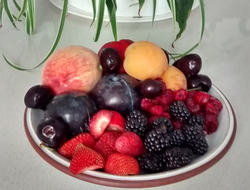Stone fruit and berries: what do they have in store for you?
Published: August 23, 2019
Are you getting your 2-3 + servings of fruit a day?
If not, perhaps it is because your favourite fruits are not among the list of “super” foods that hit the headlines such as blueberries, cranberries, pomegranates, and avocados.
While you know that citrus fruit is high in vitamin C, and an apple a day (according to your mom/grandma) can keep the doctor away, what about bananas? Is it true they are "bad" for you?
Tropical fruit, in addition to healthy nutrients, can add an exotic element to your diet.
Other fruits that are often locally grown, such as stone fruits and many berries, also contribute an array of vitamins, minerals, and phytochemicals, including antioxidants, to your diet.
While they may not by hyped up as “super fruits”, they are all “super nutritious”.
This article takes a look at stone fruit and berries that are not represented in other articles on this site, but which regularly appear on grocery store shelves and which you can find in local markets around the world.
Follow the embeded links above to learn about other fruits.
Versatility
Although these soft fruits may not freeze well, they can be eaten raw or cooked, used in desserts, ice-cream, yogurts, milkshakes, juiced, and preserved as jams, jellies, and spreads.
Pureed fruit can be frozen and added to baked goods such as cakes and muffins.
Nutrients
Most stone fruits and berries are low in calories.
The major macronutrient is water, then carbohydrate (glucose, fructose, sucrose, and fibre), with small amounts of protein and fat (mostly unsaturated fatty acids in the seeds).
Stone fruits and berries have small amounts of omega-6 fatty acids, and berries have small amounts of omega-3 fatty acids (seeds).
Despite the higher % of sugar in fruit, many stone fruits and berries have a low...link to the full article to learn more.

